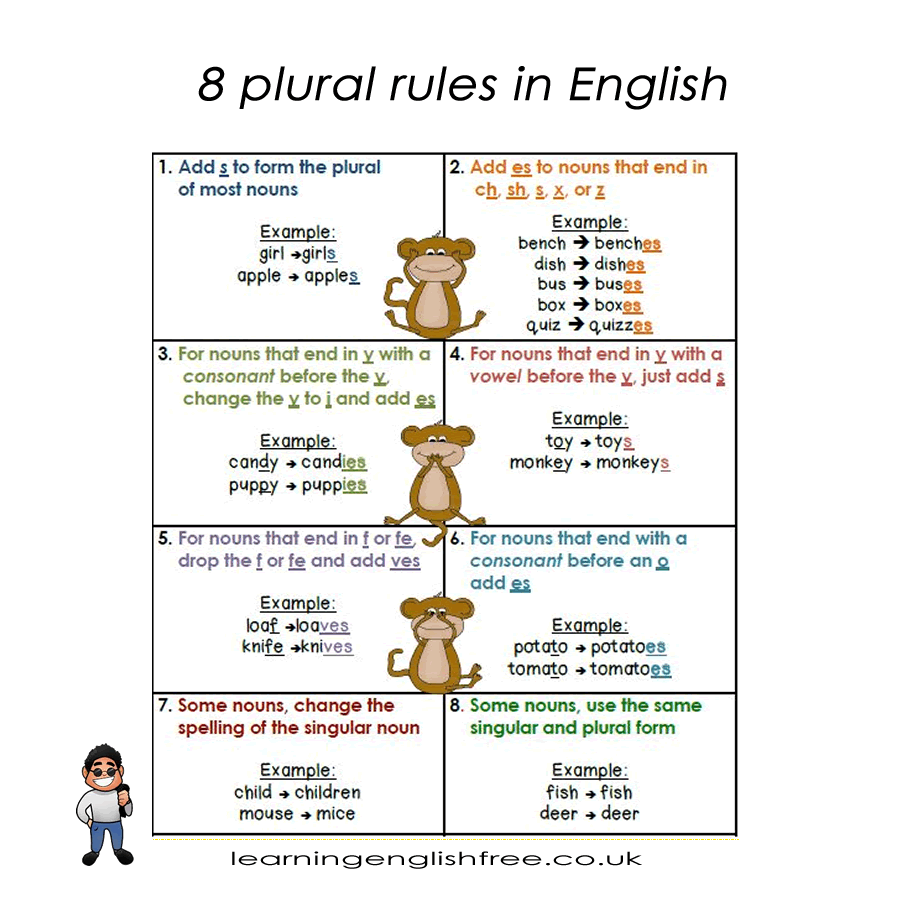
What are the 8 Plural Noun Rules?
-
Add 's' to form the plural of most nouns
- Example: girl → girls, apple → apples
-
Add 'es' to nouns that end in ch, sh, s, x, or z
- Example: bench → benches, dish → dishes, bus → buses, box → boxes, quiz → quizzes
-
For nouns that end in 'y' with a consonant before the 'y', change the 'y' to 'i' and add 'es'
- Example: candy → candies, puppy → puppies
-
For nouns that end in 'y' with a vowel before the 'y', just add 's'
- Example: toy → toys, monkey → monkeys
-
For nouns that end in 'f' or 'fe', drop the 'f' or 'fe' and add 'ves'
- Example: loaf → loaves, knife → knives
-
For nouns that end with a consonant before an 'o', add 'es.'
- Example: potato → potatoes, tomato → tomatoes
-
Some nouns change the spelling of the singular noun
- Example: child → children, mouse → mice
-
Some nouns use the same singular and plural form
- Example: fish → fish, deer → deer
Examples of how to use the eight plural rules in English
1. Add 's' to form the plural of most nouns
- "The girls are playing in the park."
- "He picked several ripe apples from the tree."
- "There are many colourful flowers in the garden."
2. Add 'es' to nouns that end in ch, sh, s, x, or z
- "She sat on the benches in the park."
- "He washed all the dirty dishes after dinner."
- "The buses arrive every ten minutes."
3. For nouns that end in 'y' with a consonant before the 'y', change the 'y' to 'i' and add 'es'
- "She bought a bag of candies for the kids."
- "The puppies are playing in the yard."
- "He took some lovely photographs on his trip."
4. For nouns that end in 'y' with a vowel before the 'y', just add 's'
- "The child has many toys."
- "A group of monkeys was seen in the forest."
- "She keeps all her keys in a bowl by the door."
5. For nouns that end in 'f' or 'fe', drop the 'f' or 'fe' and add 'ves'
- "He baked several loaves of bread."
- "She has a collection of antique knives."
- "The shelves were filled with colourful scarves."
6. For nouns that end with a consonant before an 'o', add 'es'
- "She grew potatoes in her garden."
- "He likes tomatoes in his salad."
- "The children enjoyed the heroes in the story."
7. Some nouns change the spelling of the singular noun
- "The children are playing soccer."
- "A group of mice scurried across the floor."
- "The men are working on the construction site."
8. Some nouns use the same singular and plural form
- "He caught three fish in the lake."
- "A herd of deer was grazing in the field."
- "The museum had several sheep in its farm exhibit."
